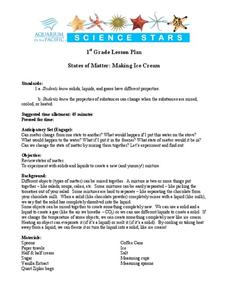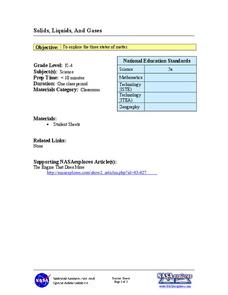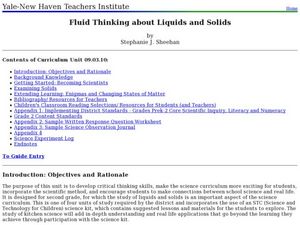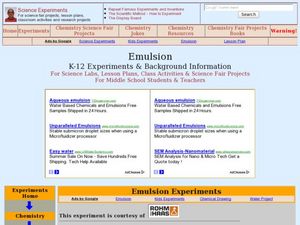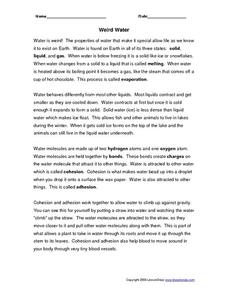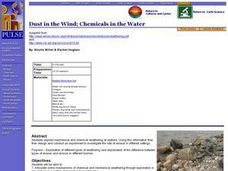Curated OER
States of Matter
Fourth graders define the term matter. They compare properties of solids, liquids, and gases. They describe how matter changes from one state to another. They classify objects as either solid, liquid, or gas.
Curated OER
Chemical Change
Fifth graders watch a demonstration in which a balloon is inflated using the gas created by combining vinegar and baking soda. Then, in groups, they combine various assigned substances and watch and record the results.
Curated OER
Making Ice Cream
First graders create ice cream in class. In this matter lesson, 1st graders discover solids, liquids and gases and the properties of each. Students produce a batch of ice cream in class using household items.
Curated OER
Solids, Liquids, and Gases
Students investigate and explore the three states of matter. They read and discuss the NASA article "The Engine That Does More," identify examples of each state of matter, and as a class complete a section of two worksheets. They...
Curated OER
Density and Buoyancy
In this density and buoyancy worksheet, students read about the equation to find density and practice finding the density of substances. They read about buoyancy and match 10 terms with their definitions related to density, buoyancy and...
Curated OER
Water 1: Water and Ice
Young scholars examine the changes as water goes from solid to liquid. In this states of matter lesson, students observe and record the changes to water as it changes from solid to liquid and back to solid.
Curated OER
Fluid Thinking About Liquids and Solids
Second graders examine the physical characteristics of the different states of matter. For this chemistry lesson, 2nd graders observe how matter changes from one phase to another. They classify substances according to its type of matter.
Curated OER
What is an Atom?
Third graders understand that the smallest particle is an atom. In this matter lesson, 3rd graders make a piece of aluminum smaller and smaller to see that what's left is still aluminum. Students recognize that cutting into smaller...
Curated OER
States of Matter
In this states of matter learning exercise, students fill in the blanks using the terms evaporation or condensation for 4 statements. They match vaporization, condensation, evaporation and boiling to their definitions. They fill in 8...
Curated OER
Emulsions
Students identify the characteristics and composition of emulsions. In this chemistry lesson, students classify household products according to emulsion type. They explain how to make the best emulsion.
Curated OER
Thermochemistry
In this thermochemistry worksheet, students indicate whether the given processes are endothermic or exothermic reactions. Students complete the phase change diagram as well as define a given set of vocabulary words. Students calculate...
Curated OER
The Conservation Of Mass (The Mass Of Gas)
Middle schoolers gain an understanding of matter in all of its phases. In this science lesson plan, students further their knowledge of the laws of conservation of mass, the loss in mass can be accounted for, when the gas is allowed to...
Curated OER
Household Chemistry
Young scholars use indicator paper to determine if substances are acidic, basic, or neutral. They test for Ph levels in them. They investigate the effect of oxygen on darkening fruit cut and exposed to the air. They observe vitamin C as...
Curated OER
Understanding Chemical Equations
In this chemical equations worksheet, students identify the reactants and the products, state what phase each is in, and state the mole ratios of all the products and reactants. Students complete 10 problems.
Curated OER
Dunking Duckies - Endless Expansion And Contraction
Learners use inquiry to explore how their dunking duckie bobs up and down. In this states of matter lesson, the teacher guides the class towards discovering how the dunking duckies continue to bob up and down for days without being touched.
Curated OER
SAFETY KNOWLEDGE BASE CHANGES
Middle schoolers research and formulate a hypothesis for research to correlate changing safety regulations in regards to personal and environmental safety polices for storage, handling and disposal of chemicals, risk involved in...
Curated OER
Earth's Ecology
Learners investigate the three states of water. In this physical science lesson, students watch the video "Earth's Ecology" and observe water in its' three states. Learners record observations.
Curated OER
Weird Water
In this weird water instructional activity, students read for information and assess comprehension. In this true and false, fill in the blank, and multiple choice instructional activity, students answer ten questions.
Curated OER
Warming by Freezing
Ninth graders discover the reasoning behind spraying water on fruit and seedlings in preparation for hard freezes. In this conceptual physics lesson plan, 9th graders conduct an experiment to measure the heat released when water goes...
Curated OER
Dust in the Wind; Chemicals in the Water
Students explore mechanical and chemical weathering at stations. They articulate some mechanisms of chemical and mechanical weathering through exploration in a lab. Students stations describe how chemical weathering differs from...
Curated OER
Melting, Freezing, and More!: Phase Transitions
Third graders listen to a talk on phase transitions and view three demonstrations. In this phases of matter lesson, 3rd graders complete a worksheet as they listen about phase transitions. They move through three demonstrations of phase...
Curated OER
Jeopardy 8th Grade (Science)
There are so many topics touched upon in this Jeopardy-style science game, that it is difficult to classify! The categories include electricity, matter, ecology, earth and space, and scientific investigation. This would best be used at...
Curated OER
Matter
Students complete a unit of activities to learn about states of matter and how to measure matter. In this matter activity, students complete 8 lessons to learn about matter, its states, and how to measure matter.
Curated OER
Activity #6 'Nothing' Matters: A Demonstration
Students observe the 'pouring' of a gas. They compare the masses (weights) and densities of two gases. Pupils define the following terms: matter, mass, and density. Students answer questions after watching the demonstration.
Other popular searches
- Chemical Changes in Matter
- Physical Changes in Matter
- Phase Changes in Matter
- Changes in Matter Activities
- Changes in Matter Water
- Changes in Matter Chemistry
- Matter Changes in State
- Changes in Matter/ Shadows
- Changes in Matter Presentation
- Changes in Matter Properities




